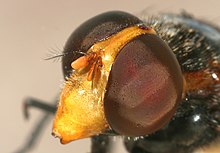Microcosm
The microcosm (from the Greek mikrós for "small" and kósmos for "(world) order") is the world of the tiny, in contrast to the macrocosm , the world of the huge. In between lies the area directly perceivable by humans, the mesocosm . The world of the even smaller, less than 100 nanometers , is called the nanocosmos .
Access to the microcosm

Until the first microscopes were used, the microcosm was an area of pure speculation. The early natural philosophers could only represent their hypotheses with logical arguments, but these were not verifiable. At the same time, however, knowledge about the microcosm is important in order to understand many natural phenomena.
It was only with modern science that it became clear that the laws that apply in the area of human dimensions cannot easily be transferred to the microcosm. For example, the world of ants , bacteria or atoms is such a microcosm in which there are laws, problems and possibilities of their own. Even at the atomic level, the laws of classical physics no longer apply, but those of quantum mechanics as the mass of the particles decreases .
Research areas
The discoveries that had been made in the microcosm prompted many fields of research.
In biology , knowledge such as the structure of living beings from cells , the biochemical processes in the cells, protozoa , bacteria , proteins , viruses , DNA were gained. The electron microscope is an important tool here .
The physics could theories of atomic structure formulate the basis of precise observations. From this arose quantum mechanics as a general theory for the physical description of the microcosm, which at the same time showed that the smallest of the world runs counter to human perception. Current research areas are elementary particle physics or nanophysics .
In the technology they now try to exploit these findings. Examples are microelectronics, nanotechnology or microtechnology , but also materials technology and the creation of complex molecules (e.g. fullerenes , nanotubes ).